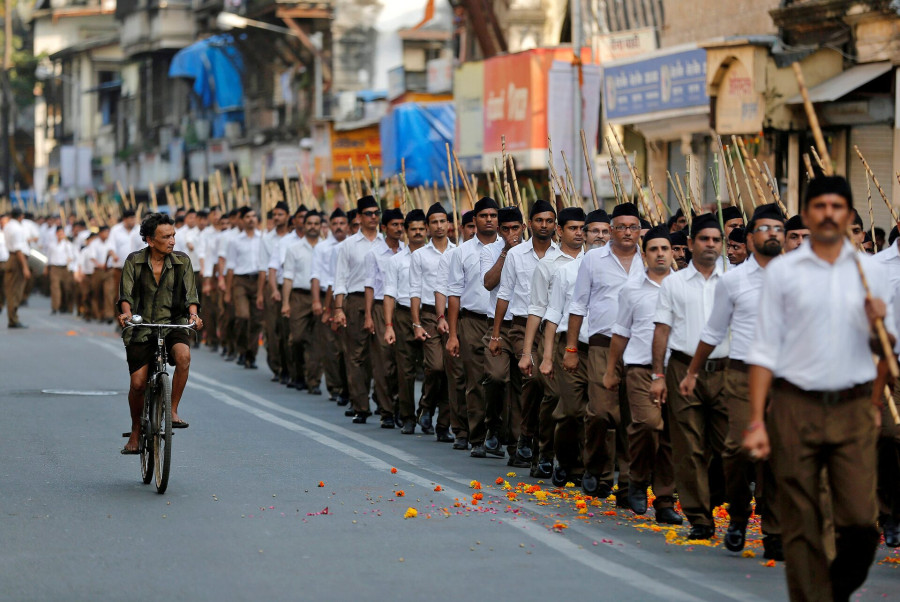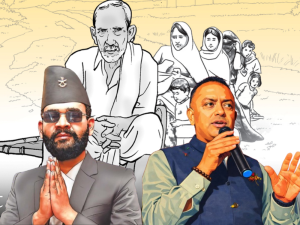Columns
Dropping ‘secular’ an affront to idea of India
Not just for India, secularism is vital for any diverse democracy aspiring to uphold civil liberties.
Ruhi Tewari
The growing demand from various right-wing quarters in India to drop the words ‘secular’ and ‘socialist’ from the Preamble of the Constitution is misplaced, imprudent and divisive in equal measure. The Rashtriya Swayamsevak Sangh (RSS)—the ideological parent of the ruling Bharatiya Janata Party (BJP)—has mooted the idea of debating whether these words ought to remain in the Preamble, with several senior union ministers and chief ministers of the BJP throwing their weight behind this push.
Knowing the ruling party’s brand of politics and the right wing’s approach to religious minorities, it hardly takes a genius to know their campaign is against the word ‘secular’ more than ‘socialist’. Ostensibly, their objection is to the undemocratic manner in which the word was introduced into the Preamble and its relevance in the Indian context. For example, in the West, the idea of secularism espouses the complete separation of religion and state, whereas in India, the foundation is that of equal respect for all religions. The BJP and its ecosystem, therefore, claim that the word ‘secular’ doesn’t fit into the Indian context, as union minister Shivraj Singh Chouhan argued by bringing in the distinction between India’s idea of “sarva dharma sambhav (equal respect for all religions)” versus the West’s “dharm nirpeksh (secular)”.
These technicalities aside, the truth is that secularism has come to be a key pillar of Indian democracy. It isn’t just a concept or a mere formality; it is the very soul of this diverse and free country. Any attempt to tamper with the word in the Preamble is a strike on that core and a challenge to what has come to define the very idea of India.
India has established its definition of secularism, in line with its culture, politics and society. This whole crusade, therefore, is an attempt to question this definition and uproot the well-established secular core of the country.
The past
It is a truth well established that the word secular was inserted into the Preamble in the most undemocratic fashion, and at the lowest point of Indian democracy. A considerable time was spent in the Constituent Assembly debates discussing the inclusion of the word in the Preamble. While there was absolute commitment to the idea of secularism, there was scepticism about the application of the word ‘secular’ in the context of India. Hence, the word was not formally included in the Preamble.
It was on June 26, 1975, that then Prime Minister Indira Gandhi imposed the draconian Emergency in India. It was a dark, dark period, marred by a brutal clampdown on civil liberties as well as freedom of speech and expression, state excesses and brazen action against the opposition.
Amid all this, a series of Constitutional Amendments were passed even as several opposition MPs were lodged in jail. Among them was the 42nd amendment, which changed the phrasing in the Preamble describing India from a ‘sovereign, democratic republic’ to a ‘sovereign, socialist, secular, democratic republic.’
The way the term secular was introduced into the Preamble, therefore, was most certainly undemocratic. However, that does not mean that its spirit isn’t wholly democratic. Even the Supreme Court, in a ruling last year, dismissed pleas challenging the inclusion of the words ‘socialist’ and ‘secular’ in the Preamble, and held that “over time, India has developed its own interpretation of secularism.”
The Supreme Court hit the nail on its head. Over the years, India has moulded the definition of ‘secular’ to fit its context, bringing it to the centre of its democratic polity.
The present
It is really a question of the past versus the present, and the wise will tell you in which we ought to live. The manner of inclusion of the word in the Preamble and its Western origins are a thing of the past, while its interpretation and applicability in the Indian context, as well as its centrality to the country’s democracy, is the crux of the present.
The biggest strength of India as a nation, as trite as it might sound, is its diversity. And at the very core of diversity is the idea of secularism. Fiddling with the ‘S’ word in the crucial document will be a grave mistake and an affront to the foundation of the Indian nation.
Post-Independent India, despite the scars of the Partition, evolved into being an inherently secular country where all religions, beliefs and faiths were equal in the eyes of the state. This isn’t to say that the country, its people, political parties or even the state have not displayed communal tendencies now and then. Communal differences and religion-based politics have hardly been unheard of, even in the pre-BJP era. But its foundation has kept the country afloat, where neither the state nor law can discriminate based on religion and faith. And thus, ‘secular’ in the Preamble isn’t a word to be taken lightly or looked at as one authoritarian prime minister’s whim.
What makes the RSS-BJP’s intent more suspect is its nature of politics—majoritarian and divisive. The party’s rise has been built on its aggressive Hindutva agenda combined with a generous dose of anti-minority-ism. Thus, when its representatives talk of eliminating the word ‘secular’ from the Preamble, it reeks of mischief, and an intent that goes far beyond just correcting an undemocratic decision from the past or addressing a technical issue.
Not just for India, secularism ought to be vital for any diverse democracy that aspires to uphold civil liberties. Equal respect for all faiths and beliefs is the very least expected of a free and fair polity. In Nepal, for instance, which was declared a secular state in 2007, the renewed cry for the return to a Hindu state is unfortunate and regressive.
The right-wing ecosystem has made it an agenda to rewrite history, and the continuous stint in power since 2014 has given it ample opportunity to do so. If the BJP erases the definition of India as ‘secular’ from the Preamble, it would be its biggest attack on the country’s diverse democracy and the most catastrophic damage to the spirit of India.




 14.86°C Kathmandu
14.86°C Kathmandu

.jpg&w=200&height=120)













